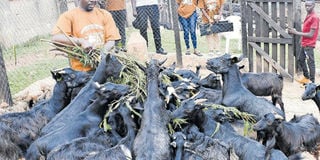
A livestock agronomist explains the value chain of goat farming during the just concluded Seeds of Gold Farm Clinic. PHOTO /ROBERT MUHEREZA
As well as being odourless and rich in nutrients, goat manure contributes to plants’ maximum growth. In addition, the manure absorbs more nitrogen by accumulating urine in goat droppings, making it a more effective fertiliser. The nitrogen content of these materials usually necessitates composting before use.
The organic matter in goat manure makes it an attractive compost choice for many farmers because goat manure contains fewer weed seeds than most other animal manures. The garden soil should be amended with goat manure six months before planting.
Ideally, it should be done during early rainy season. It is possible to maximise the growth of plants by using goat dung in garden beds. Natural dry pellets are easier to gather and apply and leave a cleaner surface than other types of manure.
The manure from goats can be used as fertiliser for flowering plants, herbs, vegetables, and fruit trees, among other things. Mulch can also be made from goat manure, which is compostable. The manure of goats is not only neater than that of cows but also does not attract insects or burn plants.
As well as being odourless and rich in nutrients, goat manure contributes to plants’ maximum growth. In addition, the manure absorbs more nitrogen by accumulating urine in goat droppings, making it a more effective fertiliser. The nitrogen content of these materials usually necessitates composting before use.
Nutrients in goat manure
Fertilisers for pastures, fields, and grass production can be obtained from animal manure, which is widely regarded as an agricultural commodity.
In general, compost is an excellent source of plant nutrients nitrogen (N), phosphorus (P), and potassium (K) and helps grow plants.
Additionally, compost replenishes soil fertility and quality by replenishing organic matter and nutrients such as calcium, magnesium, and sulfur.
The compost’s nutrient content depends on the type of animal and food, the type and amount of bedding, the moisture content, and the storage method.
How to compost goat manure
Generally, goat dung cannot be added directly to the soil, as it contains pathogens, parasites, parasitic eggs, and other potentially harmful substances. Conversely, fresh goat excrement may decompose in the soil, releasing heat that scorches plant roots.
In contrast, goat dung composted before the application will be digested by microorganisms and turned into nutrients. In addition, Composting produces a high temperature of 60 to 70°C, killing pathogens and parasites in hazardous materials. It is similar to composting any animal waste to compost rich hot goat manure. Microorganisms play a crucial role in composting.
These bacteria use oxygen and water to convert organic materials into nutrition. Additionally, the bacteria will die if the heat they generate is too high. Composting goat manure with 50-60% moisture content is ideal. It is essential to consider the temperature and oxygen concentration. Composting goat manure involves the following steps:
Prepare the basic materials for composting. Auxiliaries, such as sawdust can be added to goat manure.
Maize flour gives glucose to microorganisms and fermented culture, and rice husk controls moisture, air permeability. Second, goat manure and auxiliary materials such as sawdust and coffee husks can be stacked together. They can be stacked in long beds or put into fermenting grooves.
Windrow compost piles are typically at the height of 0.8 to 1.5 m, 1.5 to 2 m in breadth, and 2 m or more in length.
Lastly, until the fermentation is complete, turn the compost pile continuously. It is adequate to do it 2-4 times each day for the first week and once every two days for the subsequent weeks.
Using goat manure for fertiliser
Plants require a balance of nutrients for maximum growth, and this manure provides them with that. Further, goat droppings absorb more nitrogen, increasing the effectiveness of manure as a fertiliser. The best way to enrich the soil is to use goat manure in garden areas. Because it is pelletised, it can be applied directly to flower and vegetable gardens without burning them. As well as being easy to spread and till into the garden, pellets are also easy to handle.
Goat manure application
There is no guarantee that goat manure is safe because it is a natural product. A large amount of it can run off into groundwater, potentially contaminating it. Avoid using it on sloped areas, significantly when predicted by heavy rains. Fresh animal manure, including goat manure, can also contain pathogens that can cause illness.
To ensure that goat manure is well-composted, mainly when it is used for edible crops, use well-composted goat manure. Crops growing close to the ground, such as lettuce or root vegetables, should be harvested after 120 days using goat manure that has been rotted but not composted.
Benefits of goat manure
Herbs, vegetables, and other crops benefit from goat manure fertiliser. It has other uses, as well as increasing the water holding capacity of the soil.
Fertilising goat compost before use as a soil supplement is recommended. Compost should be made for 4 to 6 months before being introduced into the soil.
Before harvesting your product and before the composting process is fully compacted, apply it to the ground 120 days before harvesting.
The nitrogen content of goat manure is higher than that of cow and horse manure since goat manure is drier than cow manure. Therefore, spreads quickly and is easy to work with it.
Composting goat manure also speeds up the composting process since it allows more air to enter the pile.
New and existing gardens benefit from goat manure’s soil-building properties. For example, improving soil texture, enhancing water efficiency, and increasing oxygen soil health. In addition to providing a natural nitrogen source, goat manure also provides other nutrients.
Goat Manure
The addition of nutrient-rich animal manure to fields and pastures has been known for centuries to enrich the soil and increase crop production. Until a few years ago, cow manure was the only kind of manure readily available. However, urban farming has become popular with goats.
In addition to creamy milk for cheese, there is a steady fertiliser supply for the garden. For healthy soil and plants, goat manure is one of the best animal manure.




